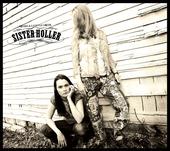To the songwriter/musician who has neither burned, bailed nor sold out, there comes a time when he or she turns from writing about who they are in the current moment to writing about who they have always been, addressing head-on their roots, sources and influences. SISTER HOLLER, the newest and 14th career release from Nerissa and Katryna Nields, is a "roots album," but with a difference. Rather than simply reinterpret or re-record the music what brung 'em, the sisters from Western Massachusetts, have decided in Sister Holler to retool, assimilate and flat out burgle the music they grew up with to create something new. They tell the listener right up front that they're even going to lift entire lines from some of the best songs ever written, and then they do it, right before your very ears. The result is a delightful oxymoron of songs simultaneously familiar and surprising.
On Sister Holler, the Nields’ "Moonlighter" revisits the old folk song, "Moonshiner" (about an alcoholic in love with the bottle) with songwriter Nerissa incorporating the actual lines, "I'll eat when I'm hungry, I'll drink when I’m dry." But in Nerissa's version the new narrator is in love with an unattainable lover. "Abington Sea Fair" is "Scarborough Fair" from a woman's point of view, with genders swapped. "This Train" is a populist anthem for today and kind of a commentary on the state of the nation, particularly the polarization between Republicans and Democrats. "We'll Plant an Oak" is a post-modern response to "The Water is Wide". On the song "Endless Day", Nerissa made the decision to use the progression from Johann Pachabel's "Canon in D", commenting, "but Blues Traveler used it. Sophie B. Hawkins used it. You can find it all over the place." Indeed, part of the fun of Sister Holler is listening for the references.
Nerissa and Katryna Nields have been the darlings of the coffeehouse/festival scene since 1991, with tunes ranging from off-the-hook idiosyncratic to kicking to heartbreaking. "Our parents were total folkies," says Nerissa. "Their first date was a Pete Seeger concert and their second was a Harry Bellefonte concert. We used to go to a family camp in the Adirondacks every summer where people sat around a fire. That's where I learned how to finger pick. The music teacher at our school, Jack Langstaff, was more of the English tradition of folk music than the American, and his legacy was really strong. We grew up on simple folk songs."
"The thing about that camp," Katryna recalls, "was that it was just part of the community. One of my top five musical memories in my entire life was one night at camp when it was cold and the fire was blazing and everybody sang 'When the Saints Go Marching In.' Just a couple guitars or maybe a banjo and people swapping songs with everybody singing along. Woody Guthrie and Weavers songs, Odetta. 'Charlie on the MTA,' 'The Frozen Logger,' 'Goodnight Irene,' 'This Land is Your Land,' 'Wabash Cannonball.' Maybe a little Bob Dylan. Bill Staines would have been considered really edgy. I know people think those old songs are quaint, but when everybody is singing them, it becomes such powerful music. Music you eventually can’t even remember where you learned it, but it becomes part of your vocabulary – I love that."
Sister Holler demonstrates that it is possible to return to tradition while growing musically into new sounds. The rhythm section from the Nields' former eponymous five-piece band remains the same, with Dave Chalfant on bass and Dave Hower on drums. Though now the hot electric guitar leads and the folk-rock attitude are replaced with banjos and accordions and mandolins and a more refined sensibility. The other significant difference between now and then is that both Nerissa and Katryna have become mothers, the presence of children in the house bringing with it a desire for greater musical directness.
"Having children has brought us back to our roots in a powerful way. I'm much more drawn to the honesty of folk music, the simplicity of it. Writing songs for this record was like falling off a log. They were all so easy to write; like coming home," says Nerissa. With Katryna adding, "My kids love singing songs from Sister Holler. And I love how, when we sing these 'Nerissa' songs in concerts, everybody sings along, even though it’s the first time they've heard them. They're songs that really invite the listener into the music making process."
And when the listener is thus invited and engaged, something happens, and for a moment, the coffeehouse, the church basement, the folk festival — or just the space between the ears of a listener wearing headphones with Sister Holler on his CD player or iPod — is turned into an Adirondack summer camp campfire sing, and we are all reminded of who we’ve always been.
That's no small thing.
photo credits: ©Jeff Wasilko
This Week's Featured Videos:
"The Soldier At Your Door" at the Iron Horse, Oct. 13 2007
"Living It Up In The Garden" at Falcon Ridge 2007
NEW!!! French Lessons with The Nields
Youth Center Or Senior Center: You Decide!
